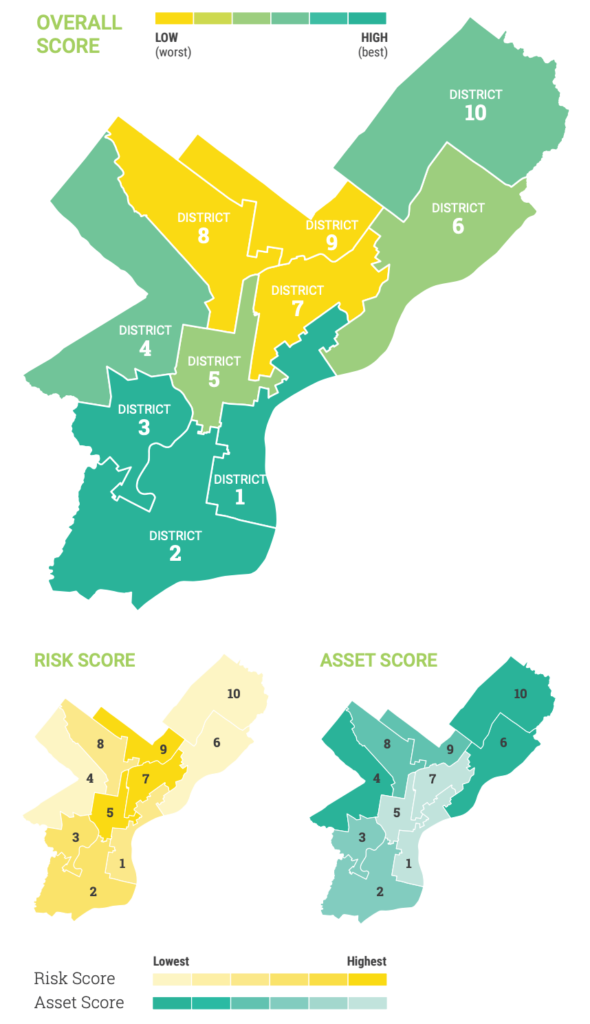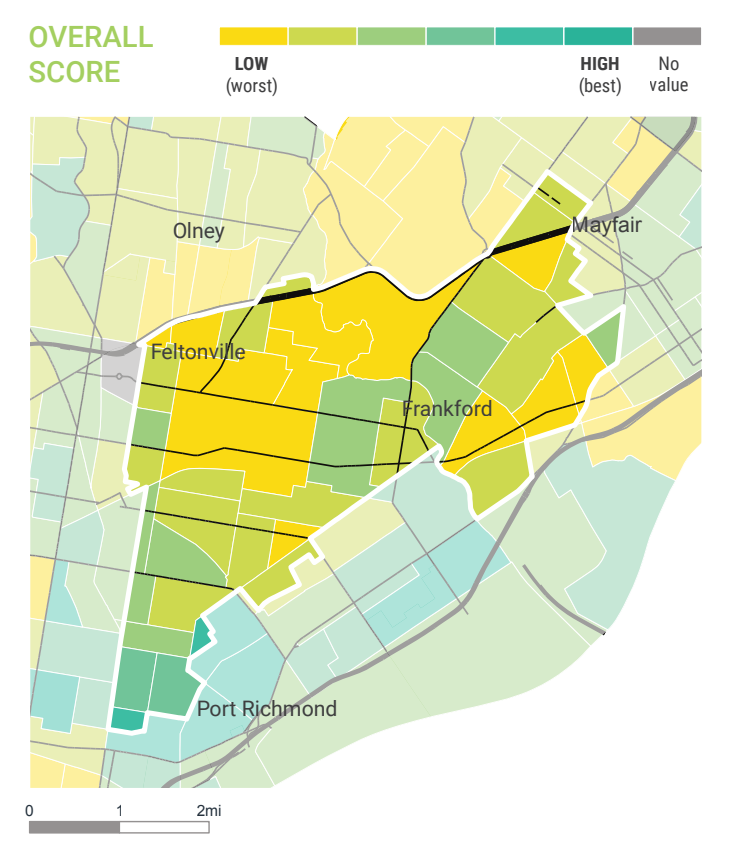What kind of data affects social change and where does it come from?
 November 2, 2020
Category: Featured, Medium, Purpose
November 2, 2020
Category: Featured, Medium, Purpose
“Good data tells us a story that can help inform a decision,” said Samantha Matlin, vice president of learning and community impact at The Scattergood Foundation, and lead for the RISE Partnership, during the third session of Episcopal Community Services’s 2020 Forum on Justice and Opportunity.
Matlin and co-panelists Ross Bernet, project manager on the data analytics team at Azavea, a certified B Corporation software development company, and Aminata Diallo, manager of learning and community impact at The Scattergood Foundation, spoke about data as a key driver of social change and wellbeing, using as examples two key initiatives from Scattergood’s portfolio.
First, Matlin and Bernet presented Place Matters: Philadelphia Children’s Health and Well-Being, a mapping project intended to inform policy and programmatic decisions in Philadelphia by flipping the script on the frequently utilized maps of deficits and crises across the city and highlighting the city’s assets in addition to its risks.
The team identified mitigating assets — including federally qualified health centers, school quality, fresh food access, and children’s behavioral health services utilization — and risks — including crime, unemployment, and adverse childhood experiences — and studied them alongside life expectancy and social mobility in each of Philly’s 10 city council districts. The resulting reports are intended to be used by government, community organizations, and residents for budget and resource allocation.
Comparing these districts to one another revealed possible policy implications. For instance, District 1 had the highest cumulative score and the lowest percentage of the city’s children, and significant assets, while District 7 had the lowest cumulative score, with rates of adults experiencing adverse childhood experiences and low educational attainment that were higher than city averages, as well as the highest percentage of the city’s children.
While acknowledging the potential difficulty of challenging an equal distribution of resources across districts, Matlin asked, “Why would we want the area with the most children not to be getting more assets and resources to build on that community’s strengths?”
Understanding of the structural racism that has contributed to the risk distribution in the city is also essential for reading these maps, according to Matlin, who pointed out that the inequity depicted in the maps tracks to the same areas targeted for redlining and areas where not all students are getting an education that works for them because of racism in schools.
These data and maps are just the beginning of the story, Matlin explained, because “we also have to talk to people and understand the opinions of experts and what community members really want in their communities.”
Next, Diallo conducted a presentation on the RISE Partnership, an initiative co-funded by eight groups including Scattergood to help regional nonprofits build their capacity for making data-driven evaluations, and described the theory and framework at the heart of the program.
According to Diallo, the collaboration of funders brings a diversity of perspective while emphasizing a mutual relationship whereby nonprofits learn data practices that are authentic and sustainable for the organizations because the funders prioritize learning from their participants.
Ultimately, the RISE Partnership supports nonprofits in becoming a learning organization by collecting and using data for its own purposes to better serve their communities rather than serving funders or researchers, which strengthens the region as a whole, according to Diallo. They will soon be accepting applications for their spring cohort.
The session concluded with a reminder from moderator Hannah Morehead, director of learning and evaluation at Episcopal Community Services, that evaluating programs doesn’t have to be a high-pressure, unapproachable undertaking.
“Something is better than nothing. Collecting one data point is more than you had before,” she said.
Panelists then also offered action items for consideration:
- Matlin suggested organizations have honest conversations about what kinds of questions would yield data that can advance positive change.
- Bernet reminded attendees that many organizations offer free resources for those looking to get started with their own data projects, including free office hours at Azavea.
- Diallo urged being intentional and meaningful with data because “for centuries we have seen how data can be used as a weapon against communities; your data impacts not only your organization but also those who are the beneficiaries of what story the data tells about the community.”
The final takeaway? We shouldn’t be intimidated by data, but we must be responsible about checking our bias and being inclusive of diverse perspectives.
Project
2020 Forum on Justice and OpportunityTrending News











